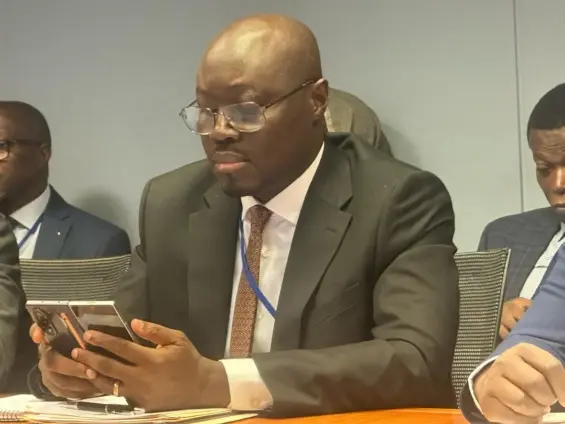The University Teachers Association of Ghana (UTAG), specifically the University of Ghana chapter (UTAG-UG), finds itself at the center of a heated controversy, demanding the resignation of the Auditor-General, Johnson Akuamoah Asiedu. This call to action stems from a recent audit report that alleges significant irregularities in the university’s financial records, particularly concerning employee compensation. According to the report, the university purportedly overstated employee compensation by a staggering GH¢59.2 million. However, this claim has been met with fierce opposition from the university management, who strongly refute the report’s findings, igniting a dispute that raises serious questions about the audit’s accuracy, fairness, and underlying motives. The core issue is the demand by **UTAG-UG demands Auditor-General resign**.
The controversy underscores the critical importance of transparency and accuracy in financial reporting within public institutions. It also prompts a broader examination of auditing practices and their potential impact on these institutions. As the situation unfolds, the implications for both the Auditor-General and the University of Ghana remain uncertain, demanding a thorough and impartial investigation to ensure accountability and restore public trust.
At the heart of the dispute is the recent payroll audit report, which claims that the University of Ghana overstated employee compensation by GH¢59.2 million between 2022 and 2024. This sparked immediate and forceful reactions from UTAG-UG, driven by what they perceive as a fundamental breach of ethical standards. Dr. Jerry Joe Harrison, Secretary of UTAG-UG, articulated the association’s concerns, highlighting a critical point of contention: the initial audit report was not shared with them for clarification before being made public. This perceived lack of engagement has fueled UTAG-UG’s outrage, leading them to question the Auditor-General’s competence and motives.
UTAG-UG views this omission as “a serious breach of the ethical standards” expected of the Auditor-General’s office. Their response has been unequivocal: they are demanding either the Auditor-General’s resignation or will petition the President for his removal, and also seek punishment for individuals involved in the audit. This bold stance underscores the depth of their concerns and their determination to hold those responsible accountable.
In response to the audit report’s allegations, the University of Ghana has vehemently defended its financial practices, dismissing the claims as misleading and lacking proper context. Prof. Samuel Simpson, UG’s Acting Deputy Internal Auditor, emphasized that “the numbers alone don’t tell the full story.” According to the university, the flagged “overstatements” were actually legitimate uses of internally generated funds (IGF) to supplement government payroll allocations. These funds, they argue, were crucial for maintaining the quality of education and services provided by the university.
Prof. Simpson provided a specific example, explaining how the university used IGF to hire additional staff to ensure a high standard of education. He stressed that the university had meticulously documented all such expenditures, countering allegations of payroll fraud. The university maintains that these practices were transparent and in accordance with established financial procedures.
“There are a lot of things that the auditor’s report doesn’t capture. The processes, the engagement that goes through, where it starts from and where it gets through, there is no way that the university engaged in any payroll fraud as is kind of alleged in this release, suggesting that the university has overstated employee compensation.” – Prof. Samuel Simpson, UG’s Acting Deputy Internal Auditor

Several key figures and institutions are at the heart of this controversy. Johnson Akuamoah Asiedu, as the Auditor-General of Ghana, is responsible for the report that has triggered the current crisis. UTAG-UG, led by Dr. Jerry Joe Harrison, is spearheading the demand for his resignation. On the other side, Prof. Samuel Simpson is the voice defending the University of Ghana’s financial conduct. And of course, the University of Ghana (UG) itself, as a leading institution, is facing serious reputational challenges.
The audit report asserts that the University of Ghana overstated employee compensation by GH¢59.2 million between 2022 and 2024. It claims the university submitted salary claims totaling GH¢1.09 billion, but only GH¢1.03 billion was cleared after verification. The report also encompasses broader financial recoveries based on recommendations from 2020 to 2023 Auditor General reports, including disallowances and payroll savings up to December 31, 2024.
The university counters that the GH¢59.2 million was not an overstatement but a legitimate use of IGF to supplement payroll, a practice they claim is transparent and well-documented. This discrepancy in interpretation highlights the fundamental disagreement at the core of the controversy.
The demand by UTAG-UG for the Auditor-General to resign carries significant potential implications. It could lead to increased scrutiny of the Auditor-General’s office, potentially resulting in his resignation or removal from office. Furthermore, the allegations, even if disputed, could inflict reputational damage on the University of Ghana. More broadly, this case underscores the importance of clear communication and collaboration between auditors and the institutions they audit. Failure to engage in such dialogue can lead to misunderstandings, mistrust, and ultimately, public disputes that undermine confidence in both the auditing process and the institutions involved.
The demand by UTAG-UG for the Auditor-General’s resignation reflects a profound disagreement over the interpretation and accuracy of the audit report. While the Auditor-General’s office alleges financial irregularities, the University of Ghana vehemently denies these claims, asserting the legitimacy of its financial practices. This situation underscores the need for transparent and collaborative auditing processes to ensure accountability and maintain public trust. The coming weeks and months will determine the fate of the Auditor-General and the impact on the University of Ghana. The core issue remains the validity of the audit report and whether **UTAG-UG’s demands for the Auditor-General to resign** will be met.
Image Source: MYJOYONLINE





















